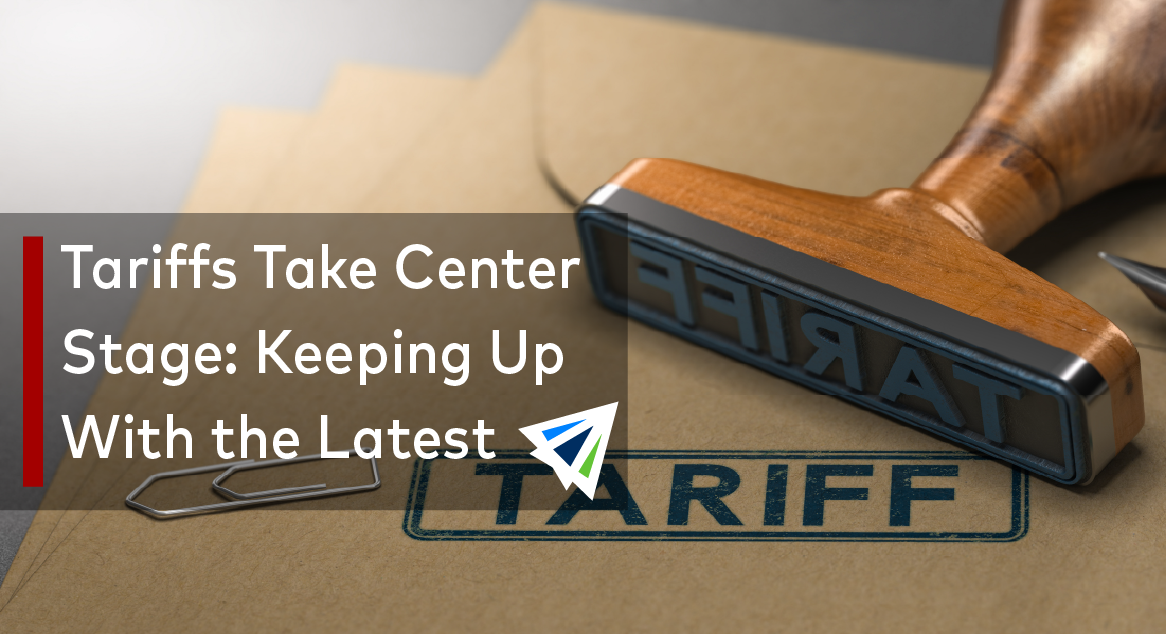Tariffs Take Center Stage: Keeping Up With the Latest
Tariffs—a term you’ve probably heard more than you’d like lately—are taxes or duties imposed by one country on goods imported from another. They serve different purposes, including protecting domestic industries from foreign competition, raising government revenue, and influencing trade balances.
Tariffs can vary in form, such as specific tariffs (a fixed fee per unit of goods) or ad valorem tariffs (a percentage of the good’s value). While they can be a tool for economic policy, tariffs can also lead to trade disputes and higher costs for consumers.
In this blog we are focusing on the role tariffs play in the supply chain/logistics sector, recent tariffs that have been announced and what may be on the horizon. We’ll also highlight the importance of partnering with a provider who stays ahead of these industry changes to keep their customers informed.
Key Takeaways:
- Who is impacted? What are the effective dates?
- Staying informed is key.
Recent Tariffs Announced
On February 1st, President Trump issued an executive order that was set to impose new tariffs on imports from our cross-border neighbors and China.
Here’s a brief breakdown:
Canada/Mexico: Canada and Mexico imports into the U.S. were set to face 25% tariffs. However, as of February 3rd, they were paused for 30 days. Thus delaying the potential effective date to March 4th. This comes after the President of Mexico and Prime Minister of Canada reached an agreement with U.S. President Trump on matters regarding border security, per CNBC.
China: Chinese (and Hong Kong) imports into the U.S. saw an additional 10% tariff, effective February 4th.
On February 4th, the U.S. ended the de minimis duty rules for China/Hong Kong imports, which allowed goods valued under $800 to be imported duty-free. The following day, the U.S. reversed its decision, allowing the de minimis duty rules to remain in effect until “adequate systems are in place to fully and expediently process and collect tariff revenue,” according to the signed White House amendment.
In response, on February 4th the U.S. Postal Service briefly suspended parcel service from China and Hong Kong to the U.S, per Transport Topics. However, the suspension was short-lived, with the temporary pause ending on February 5th, in response to the U.S. reversing course on ending de minimis duty rules.
What Lies Ahead?
Some tariffs have already been announced and are either in effect or delayed, while others have been proposed but have not yet taken effect, creating uncertainty among industry stakeholders.
President Trump has proposed additional tariffs, now targeting all steel and aluminum, with no exclusions, set to take effect on March 12th. Currently, steel imports face a 25% tariff under Section 232, with some exclusions in place. Aluminum imports are currently subject to a 10% tariff (Section 232), but if the proposed tariffs are implemented, the rate would increase to 25%.
He has also suggested imposing tariffs that mirror those of countries with higher tariffs on U.S. goods than the U.S. charges on the same items. Additionally, he has proposed universal tariffs that would affect all goods from every country. Further information is still awaited regarding the specifics of these measures.
Shippers need to stay informed about the tariffs currently in place or those set to be potentially implemented, as well as any applicable exemptions. It is crucial to work with your forwarder to determine how these tariffs specifically impact your shipments and evaluate strategies to mitigate risk.
While we can’t predict future tariff announcements and in effect dates, we do have a dedicated team focused on managing risks and providing solutions for shippers who have questions or want to have a conversation about it. Contact us at: support@interlogusa.com and we’ll connect you with the right person.
Last Remarks
InterlogUSA continues to stay up to date on the latest in the market, to provide our customers and readers with the latest industry news. Should you have any questions, please send an email to our team today: support@interlogusa.com . Additionally, we have our weekly newsletter that can provide you with relevant freight news, updates, developments across the industry, and more.
